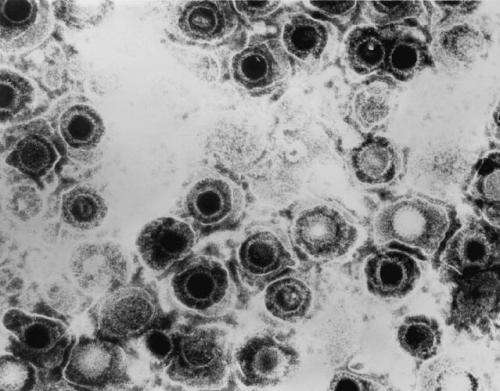Researchers discover how cancer-causing virus could stay silently hidden in your body

Researchers at the University of Pittsburgh have discovered a new mechanism that could explain how the Merkel Cell Polyomavirus, responsible for the most aggressive form of skin cancer, can stay dormant for decades after infection but then reemerge to cause cancer. The results are published online this week in the journal Proceedings of the National Academy of Sciences.
The Merkel Cell Polyomavirus (MCV), was discovered in 2008 by Yuan Chang, M.D., American Cancer Society Research Professor and a Distinguished Professor of Pathology, and Patrick Moore, M.D., American Cancer Society Research Professor, a Distinguished Professor of Microbiology and Molecular Genetics, and the Pittsburgh Foundation Chair in Innovative Cancer Research in Pitt's School of Medicine. Moore also serves as the director of the Cancer Virology Program at the University of Pittsburgh Cancer Institute.
In general, viruses ensure their survival by either defeating their host's immune system and replicating themselves or finding a new host. However, sometimes, viruses can remain silent in the body without replicating, periodically reactivating when the conditions are appropriate, such as when the host has a weakened immune system.
The ability to remain silent, called "latency," is what allows the herpes simplex viruses, for example, to stay dormant in people and periodically reemerge to cause mouth and genital ulcers. Herpes viruses use complex molecular mechanisms to maintain latency. However, unlike the herpes viruses, MCV has a much smaller amount of DNA and does not have its own latency mechanism.
In the current study, published by the Chang-Moore laboratory, the lead author Hyun Jin Kwun, Ph.D., research associate in the Chang-Moore laboratory, used cell culture models to show that to stay dormant, MCV instead hijacks the cell's normal degradation machinery. The virus takes advantage of cellular molecules called SCF E3 ligases, which normally function in the cell to tag cellular proteins destined to be broken apart by the proteasome, the cell's protein recycling factory.
"Normally, viruses use elaborate measures to avoid being degraded by the cell so that they can infect a new host. But in a form of molecular jujitsu, MCV ensures that a key protein required for its replication is continually degraded so that the virus, retained as a naked piece of DNA, is not eliminated by the proteasome, which only degrades proteins," said Moore. The researchers call this process 'protein-mediated viral latency.'
But MCV can reactivate to form infectious viruses under adverse conditions when it senses the need to find a new host. Loss of nutrients, for example, makes cells shut off some SCF E3 ligases, which allows the MCV replication protein to build up to generate new viruses. If the viral DNA breaks apart during replication, it can integrate into the cell DNA, putting someone at risk for developing Merkel cell carcinoma. If replication is successful however, it causes no symptoms and the MCV can be stealthily transmitted to a new host.
The researchers note that the findings, described in a cell culture model, need to be confirmed in natural infection in human tissues. The Chang-Moore lab currently is determining whether MCV is the only virus to use protein-mediated viral latency or if other small viruses also use similar mechanisms to hide in the human body.
More information: Hyun Jin Kwun et al. Protein-mediated viral latency is a novel mechanism for Merkel cell polyomavirus persistence, Proceedings of the National Academy of Sciences (2017). DOI: 10.1073/pnas.1703879114
Journal information: Proceedings of the National Academy of Sciences
Provided by University of Pittsburgh
















